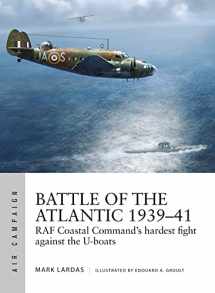
Battle of the Atlantic 1939–41: RAF Coastal Command's hardest fight against the U-boats (Air Campaign)
Book details
Summary
Description
This is the David-and-Goliath story of how RAF Coastal Command battled with outdated aircraft against the deadly U-boat fleet during the crucial first years of World War II.
In his six-volume series The Second World War, Winston Churchill wrote “The only thing that ever really frightened me during the war was the U-boat peril.” But initially, everyone was surprised at the efficiency of the submarines. Sonar proved less effective a detection method than the British had predicted; surface attack made the U-boat invisible, especially at night; and wolf-pack tactics overwhelmed convoy escorts. Only faulty German torpedoes and the restricted number of available U-boats limited their success.
Astonishingly, Britain had the major piece of the solution to the U-boat threat from the opening days of World War II: the antisubmarine aircraft. If it had been used assiduously and effectively in the first months of the war, Britain might have won the Battle of the Atlantic in its first year. Instead, the opportunity was missed and the Battle of the Atlantic continued until Germany's surrender in May 1945.
This title examines the role played by aircraft in the early years of the Battle of the Atlantic. Highlighting their success when employed effectively, the book follows these early operations to show how and why aircraft were initially misused. It also traces the development of technologies which made aircraft more effective submarine killers including radar and depth charges.


We would LOVE it if you could help us and other readers by reviewing the book
Book review



